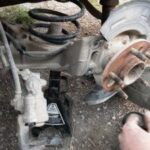Car repossession is a situation no vehicle owner wants to face, but understanding the process, especially how repo men find cars, is crucial if you’ve fallen behind on payments. Repo companies utilize a range of strategies, blending advanced technology with time-tested investigative techniques to locate vehicles for repossession. These methods are designed to be efficient while adhering to legal regulations and respecting personal privacy as much as possible.
Alt text: Repo man operating a tow truck, preparing to repossess a vehicle, highlighting the active role in vehicle recovery.
Methods Repo Men Use to Find Cars
When lenders need to repossess a vehicle due to missed car payments or violations of loan terms, they task repo companies with the job. These companies employ various methods to track down vehicles, leveraging technology and investigative skills. Here are some common techniques used to find cars for repossession:
1. License Plate Recognition (LPR) Systems
One of the most significant tools in a repo man’s arsenal is License Plate Recognition (LPR) technology. These systems utilize cameras, often mounted on vehicles or placed in strategic locations, to automatically scan license plates. The scanned data is then cross-referenced with vast databases that contain information on vehicles in default or subject to repossession.
LPR systems can quickly process thousands of license plates, making it incredibly efficient to identify vehicles linked to delinquent loans. Repo agents can deploy LPR-equipped vehicles in public areas like roads, parking lots, and even residential streets to sweep for target vehicles. This technology significantly speeds up the process of locating cars compared to manual methods.
2. GPS Tracking Technology
In today’s connected world, many vehicles come equipped with GPS tracking systems, often for navigation, safety, or even theft recovery. Lenders are increasingly using GPS tracking as a tool in auto loans, especially for borrowers with higher risk profiles. When a borrower defaults on their loan payments, the lender can activate the vehicle’s GPS tracking system to pinpoint its precise location.
This technology provides real-time location data, allowing repo men to know exactly where the vehicle is currently parked. GPS tracking drastically reduces the search time and increases the efficiency of repossession, as agents can go directly to the vehicle’s location without extensive searching.
3. Skip Tracing Techniques
Even with technology, sometimes a vehicle’s location isn’t immediately apparent. In these situations, repo agents employ “skip tracing” techniques. Skip tracing is essentially an investigative process aimed at locating individuals or assets – in this case, vehicles. It involves digging into various data sources to find clues about the vehicle’s whereabouts.
Repo men conducting skip tracing might examine credit reports for address history, delve into financial records for potential leads, and search contact information databases. They analyze patterns and connections to build a picture of where the borrower and, by extension, the vehicle might be located. This can involve checking public records, social media, and even old addresses associated with the borrower.
4. Physical Surveillance and Investigation
While technology provides a powerful starting point, sometimes old-fashioned physical surveillance is necessary. Repo men may conduct physical surveillance, especially when they have narrowed down potential locations for the vehicle. This could involve monitoring places associated with the borrower, such as their home, workplace, or frequently visited locations like gyms or family residences.
Physical investigation can be combined with data analysis from skip tracing and technology to narrow down the search area. Repo agents might discreetly observe these locations, looking for the vehicle in question. This method is more labor-intensive but can be effective when other methods yield limited results or to confirm a vehicle’s presence at a specific location before attempting repossession.
Alt text: Car repossession scene depicting a vehicle being towed away, emphasizing the action of repossession and its impact on vehicle owners.
Legal Rights and Boundaries for Repo Men
While repo men have the legal right to repossess vehicles on behalf of lenders, their actions are governed by strict laws and regulations. Understanding what a repo man can and cannot legally do is vital for both repo agents and borrowers. These boundaries are in place to ensure fairness and prevent breaches of peace during the repossession process.
1. What Repo Men Can Legally Do
Repo men are legally authorized to repossess vehicles from public spaces. This means they can typically take a car from locations like:
- Public streets
- Parking lots (shopping centers, apartment complexes)
- Driveways (as long as they don’t breach the peace to access the driveway)
Essentially, if the vehicle is accessible from a public area, a repo man can legally take it without needing to obtain any special permissions. They do not need to provide advance notice before repossessing the vehicle in many states, although some states may have notification requirements after the repossession.
2. What Repo Men Are Prohibited From Doing
There are significant limitations on what a repo man can legally do. They are strictly prohibited from:
- Breaching the Peace: This is a critical legal concept. A repo man cannot cause a disturbance, confrontation, or commit illegal acts during a repossession.
- Forceful Entry: Repo men cannot break into a garage, cut locks, or damage property to access a vehicle.
- Using Coercion or Threats: They cannot threaten, intimidate, or use aggressive behavior towards the borrower or anyone else present.
- Misrepresentation: Repo agents cannot pretend to be law enforcement or use deceptive tactics to take the vehicle.
- Taking Personal Property: While they can repossess the vehicle, they generally cannot take personal property that is not permanently attached to the car. They should allow the borrower to retrieve personal items.
3. Respect for Property
Repo men must respect private property rights. They cannot enter “closed or secured spaces” to repossess a vehicle without the borrower’s permission. This includes:
- Locked Garages: Entering a locked garage to take a car is illegal.
- Fenced Areas: Climbing fences or entering enclosed yards to reach a vehicle is prohibited.
- Locked Compounds: Gaining unauthorized access to secured areas is a breach of peace.
If a vehicle is located in any of these private or secured locations, the repo man generally cannot legally repossess it without a court order or the borrower’s voluntary cooperation.
4. Maintaining Peaceful Repossession
The overarching principle is that repossession must be peaceful. Repo agents are legally obligated to avoid confrontations and actions that could escalate tensions. They must conduct the repossession discreetly and without causing a scene. Any action that disturbs the peace can have legal consequences for the repo company and the lender.
Breach of Peace During Repossession: What It Means
“Breach of peace” is a central legal concept in repossession law. It refers to any action by a repo man that goes beyond simply taking the vehicle and instead involves disruptive, confrontational, or illegal behavior. Understanding what constitutes a breach of peace is crucial because it defines the legal limits of repossession activities.
1. Forceful Entry or Trespassing as Breach of Peace
As mentioned earlier, forceful entry into private property is a clear example of breaching the peace. If a repo man enters a locked garage, breaks a gate, or otherwise trespasses onto secured private property without authorization to get to the vehicle, this is a breach of peace. The law protects individuals’ right to privacy and security on their own property.
2. Confrontational Actions as Breach of Peace
Actions that create disturbances or confrontations are also considered breaches of peace. This includes:
- Verbal Threats or Abuse: If a repo man yells, curses, or threatens the borrower or others present, it can be deemed a breach of peace.
- Physical Confrontation: Any physical altercation or aggressive behavior by the repo man is a serious breach of peace.
- Causing a Public Disturbance: Actions that create a scene or commotion in public, drawing unwanted attention and causing alarm, can be considered a breach of peace.
3. Violation of Property Rights as Breach of Peace
Disregarding property boundaries or attempting to seize a vehicle unlawfully constitutes a breach of peace by violating the borrower’s property rights. This can include attempting to repossess a vehicle from inside a closed garage or fenced yard without permission. Repo men must respect legal constraints and operate within the bounds of the law regarding property rights.
4. Disturbance of Public Peace as Breach of Peace
Even in public spaces, a repo man must conduct repossession without disturbing the public peace. Actions that cause a public commotion, block traffic unnecessarily, or create a dangerous situation could be seen as a breach of peace. The repossession should be carried out in a manner that minimizes disruption to the public.
Legal Consequences of Breach of Peace
When a repo man breaches the peace during a repossession, there can be significant legal ramifications for both the repo agent and the lender. These consequences are designed to protect borrowers from unlawful and aggressive repossession tactics.
Violating these boundaries and breaching the peace can lead to:
- Legal Actions and Lawsuits: Borrowers can sue the lender and/or the repo company for damages resulting from the breach of peace.
- Financial Penalties and Fines: Courts can impose fines on repo companies or lenders for illegal repossession practices.
- Requirement to Return the Vehicle: In some cases, if a breach of peace occurred, a court may order the lender to return the repossessed vehicle to the borrower.
- Damages for Emotional Distress and Property Damage: Borrowers may be able to recover compensation for emotional distress, property damage, and other losses resulting from the unlawful repossession.
Understand Your Legal Options: Free Case Review from a Repossession Lawyer
If you are facing car repossession or believe that a repo man has violated your rights or breached the peace during a repossession, it’s crucial to understand your legal options. Seeking a free case review from a repossession lawyer is a vital first step.
A consumer rights repossession lawyer can:
- Assess the Legality of the Repossession: They will examine the details of your case to determine if the repossession was legal and if your rights were violated.
- Identify Breaches of Peace: Lawyers are experts in repossession law and can identify actions that constitute a breach of peace.
- Determine Potential Damages: They can evaluate the damages you may have suffered due to an unlawful repossession, including financial losses and emotional distress.
- Outline Legal Recourse: A lawyer will explain your legal options, which may include suing the lender or repo company to recover damages or get your vehicle back.
- Provide Legal Representation: If you decide to take legal action, a repossession lawyer can represent you in negotiations or in court, advocating for your rights and best interests.
A free case review provides you with valuable information and guidance without any initial cost or obligation. It’s an opportunity to understand your rights and explore your options if you believe you have been subjected to an illegal or improper car repossession. Contact a repossession lawyer to get clarity on your situation and take informed steps to protect your rights.
In conclusion, while repo men have methods to find cars for repossession, their actions are not without limits. Understanding how repo men find cars and the legal boundaries they must adhere to is empowering for vehicle owners. If you believe your rights have been violated during a repossession, seeking legal advice is essential to protect yourself and explore your legal options.


